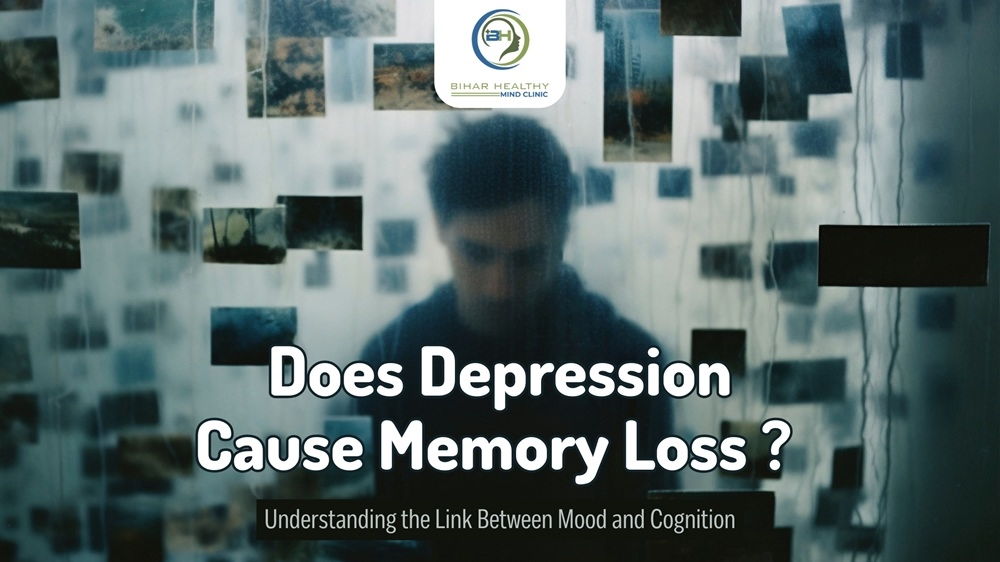
Ever found yourself entering a room only to forget the reason you went in? Everyone experiences occasional forgetfulness. But when these lapses become frequent and coincide with persistent sadness or emotional numbness, it may be more than just everyday forgetfulness, it could be linked to depression.
Many people wonder: Does depression cause memory loss? or Can depression cause memory loss? The connection between depression and memory loss is real, and understanding it can help in managing both effectively.
At Patna Psychiatry, under the expert care of Dr. Saurabh Kumar, MD (Psychiatry), widely regarded as the Best Psychiatrist in Patna, individuals receive holistic treatment that addresses not just mood symptoms but also associated cognitive challenges.
How Depression Affects the Brain
Depression is not just an emotional disorder; it significantly affects brain structure and function. Research using neuroimaging shows that areas of the brain involved in memory—such as the hippocampus, prefrontal cortex, and amygdala are often impacted in people with chronic depression.
When a person experiences depression, there is a dysregulation of key neurotransmitters like serotonin, norepinephrine, and dopamine. These brain chemicals are vital for mood regulation, memory encoding, and recall. When their levels drop, memory performance can be compromised.
Does Depression Cause Memory Loss?
Yes, depression can lead to memory loss, particularly short-term memory impairment and difficulties in concentration.
-
This is especially true for:
- Working memory (remembering instructions or holding onto new information briefly)
- Episodic memory (recalling past events)
- Attention span (staying focused during tasks)
-
People with depression often report:
- Forgetting appointments
- Losing track of conversations
- Difficulty studying or working
- Misplacing objects frequently
These issues are not signs of dementia but rather "pseudo-dementia", a cognitive slowdown caused by mood disorders.
Depression and Memory Loss: What Research Says
-
Numerous studies have established a clear link between depression and memory loss:
- A 2015 study in the journal Psychological Medicine found that people with major depressive disorder performed worse on memory tasks, even when they were not in an active depressive episode.
- MRI scans of individuals with chronic depression show shrinkage in the hippocampus, a key brain region for forming new memories.
- This scientific evidence underscores the importance of recognizing memory loss not just as an aging-related issue but also as a psychiatric symptom that warrants timely intervention.
Who Is Most at Risk?
While depression can cause memory loss at any age, the following groups may be more vulnerable:
- Older adults with late-onset depression
- Individuals with untreated or chronic depression
- Those with co-occurring conditions like anxiety or PTSD
- People under long-term stress or sleep deprivation
It’s also worth noting that some antidepressants and medications can influence cognitive function. This is why consulting a psychiatrist is essential for safe and effective treatment planning.
The good news is that memory issues related to depression are often reversible with proper treatment. As mood improves, so does cognitive function.
-
Effective interventions include:
- Psychiatric medication: Antidepressants can help balance neurotransmitters and improve both mood and memory.
- Cognitive-behavioral therapy (CBT): This goal-oriented talk therapy is designed to enhance mental clarity, focus, and the ability to concentrate.
- Lifestyle adjustments: Staying active, eating nutritious meals, and getting enough rest can contribute to better brain function.
- Mindfulness and meditation: These practices enhance cognitive flexibility and memory retention.
At Patna Psychiatry, comprehensive care combines all these elements. Dr. Saurabh Kumar, MD (Psychiatry), ensures that every patient receives an individualized treatment plan that addresses both mood and memory challenges.
When to Seek Help
If you're experiencing ongoing forgetfulness, mental fog, or difficulty concentrating alongside low mood, don’t dismiss it as normal tiredness. These could be signs of depression-related cognitive impairment.
-
Consulting with a qualified mental health professional is essential if:
- You forget recent conversations or tasks
- Your memory lapses are affecting your job or relationships
- You feel emotionally numb or hopeless most days
- You're withdrawing socially or losing interest in activities
Seeking help is not a sign of weakness, it’s a powerful step toward recovery.
Why Choose Patna Psychiatry?
Situated centrally in Patna, Patna Psychiatry is recognized as a leading facility for comprehensive mental health services. Under the guidance of Dr. Saurabh Kumar, a trusted name and Best Psychiatrist in Patna, the clinic offers compassionate, evidence-based solutions for a range of conditions including those involving both depression and memory loss.
-
Patients are provided with:
- Confidential psychiatric evaluation
- Neuropsychological testing (if needed)
- Tailored treatment plans
- Continued follow-up and lifestyle coaching
Whether you’re struggling with memory issues or emotional instability, Patna Psychiatry is your partner in holistic mental wellness.
Final Thoughts
So, does depression cause memory loss? The answer is a resounding yes, but it’s also manageable and, in many cases, reversible. Depression doesn't just impact emotions; it affects how we process, store, and recall information.
If you or someone you care about is navigating the complexities of mood and memory, help is available. With professional guidance from experts like Dr. Saurabh Kumar at Patna Psychiatry, you can reclaim both emotional balance and mental sharpness.
Disclaimer: All characters and events depicted in this blog are entirely fictional. Any resemblance to actual persons, living or dead, is purely coincidental. The content is intended for informational purposes only and should not be considered as medical advice. Always consult a qualified healthcare professional for medical concerns.
Visitors: 90





No comments yet.